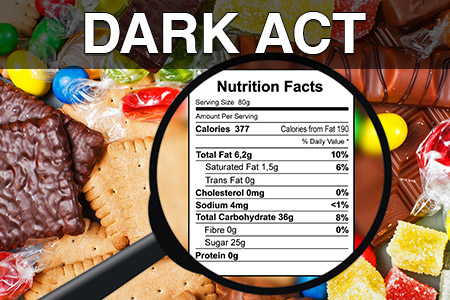The law fight of GMO Label took a turn last March after it was decided by the Senate Agriculture Committee Vote to pass the Safe and Accurate Food Labeling (SAFE) Act of 2015. However, a few GMO labeling advocates have termed it as “the DARK Act”, believing it to have a catch. The Denying Americans the Right to Know (DARK) Act, if voted into law, the bill would block states mandating labeling on genetically modified (GMO) foods into doing so, and will also preempt the state laws requiring labeling to go into effect.
The introduced bill would establish a voluntary labeling food standard made with the GMOs, similar to the bill the house had already passed. Proponents of the bill argue that a GMO labeling policy patchwork of 50-states would turn costly. GMA, already having slapped numerous lawsuits and spending millions in lobbying against the mandatory labels at federal and state levels on its sleeve, commended the vote.
“We thank Senator Roberts for his leadership to find a common-sense solution that now goes to the full Senate with bipartisan momentum. It is critically important that the full Senate pass this legislation as quickly as possible and for the bill to be voted on by the House. Vermont’s mandatory labeling law goes into effect on July 1, and this law could increase food costs for families across the nation by an average of $1,050 a year.” Stated CEO Pam Bailey in early March.
On the other hand, opponents exhibited polls saying that a majority of Americans would want to know the labeling standard for GMO foods they are eating, which is a consumer’s right in 64 countries around the globe. Pan-US voters have been demanding for food transparency, and more than 30 states have already introduced the GMO labeling mandate.
“The version of the DARK Act that passed the Senate Agriculture Committee today would rob Americans of their right to know what’s in their food. Nine out of ten Americans want the same rights as consumers in Russia, China and more than 60 other nations that require mandatory GMO labeling,” said Scott Faber, Senior VP, Government Affairs, Environmental Working Group. He also stated, “The truth is, food companies change their labels all the time to highlight innovations or make new claims. Adding a few words on the back of the package as part of a routine label change will have no impact on the cost of making food, studies show.”
In the middle of all this Dark Act and GMO labeling hullabaloo, some ranking members voted against the draft bill to find a compromise which could work well for both the industry and the consumers. Three out of 9 democrats voted for the bill to go to full senate while all the republicans voted in its favor.
Now that the compromise bill to label standards for GMO foods is here, despite of being a first legislation introduced by congress, there are certain limitations when it comes to meeting consumer expectations. Expert speaker Norma Skolnik, in a webinar The DARK Act/GMO Labeling and what’s New, to be hosted on Tuesday, August 16, 2016, will talk about the status of GMO in US, how they are FDA-regulated, the attempts such as Safe & Accurate Food Labeling Act of 2015, and how they are going to legislate their labeling.


